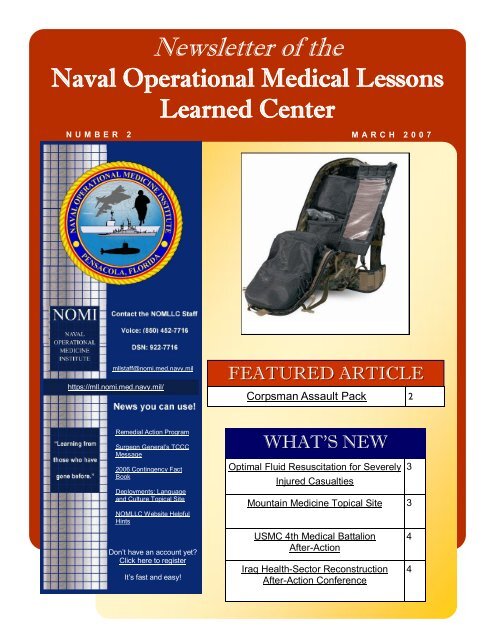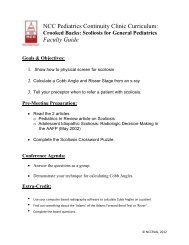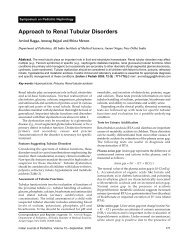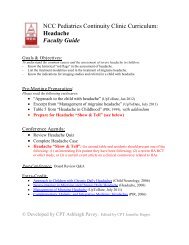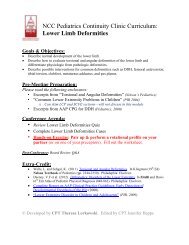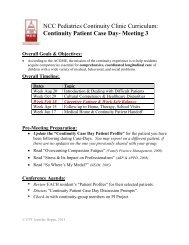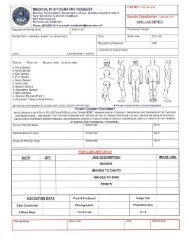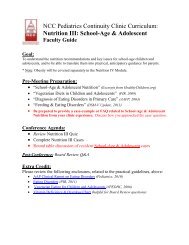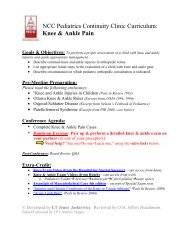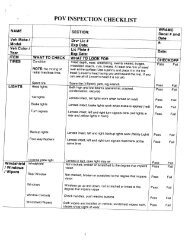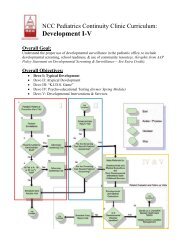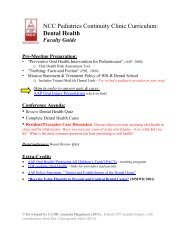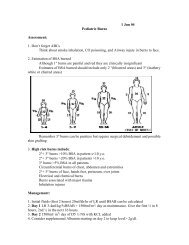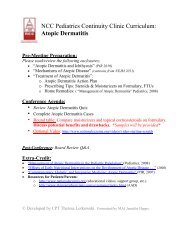NOMLL - NAVAL OPERATIONAL MEDICAL LESSONS LEARNED
NOMLL - NAVAL OPERATIONAL MEDICAL LESSONS LEARNED
NOMLL - NAVAL OPERATIONAL MEDICAL LESSONS LEARNED
You also want an ePaper? Increase the reach of your titles
YUMPU automatically turns print PDFs into web optimized ePapers that Google loves.
Newsletter of the<br />
Naval Operational Medical Lessons<br />
Learned Center<br />
N U M B E R 2<br />
M A R C H 2 0 0 7<br />
mllstaff@nomi.med.navy.mil<br />
https://mll.nomi.med.navy.mil/<br />
FEATURED ARTICLE<br />
Corpsman Assault Pack 2<br />
Remedial Action Program<br />
Surgeon General’s TCCC<br />
Message<br />
2006 Contingency Fact<br />
Book<br />
Deployments: Language<br />
and Culture Topical Site<br />
<strong>NOMLL</strong>C Website Helpful<br />
Hints<br />
WHAT’S NEW<br />
Optimal Fluid Resuscitation for Severely<br />
Injured Casualties<br />
Mountain Medicine Topical Site 3<br />
3<br />
Don’t have an account yet<br />
Click here to register<br />
It’s fast and easy!<br />
USMC 4th Medical Battalion<br />
AfterAction<br />
Iraq HealthSector Reconstruction<br />
AfterAction Conference<br />
4<br />
4
N U M B E R 2<br />
P A G E 2<br />
Naval Operational Medical<br />
Lessons Learned Center<br />
“We support America’s war fighters<br />
through stateoftheart resources,<br />
medical knowledge and research.”<br />
Phone: 8504527716<br />
DSN: 9227716<br />
mllstaff@nomi.med.navy.mil<br />
Log on now to see the features<br />
of all these web tools at:<br />
https://mll.nomi.med.navy.mil<br />
IMPORTANT NOTICE<br />
Recently the Navy Operational Medicine Institute, along with<br />
other Navy Medicine Commands has moved to the NMED domain<br />
server. In order to continue to provide you with current<br />
information and our quarterly newsletter, request you log on to<br />
Naval Operational Medical Lessons Learned Center using the<br />
original email address and password and then click on “My<br />
Profile” located in the top left hand side of the page. Type your<br />
new email address and click on save. This will be your “New”<br />
login name. Your cooperation is greatly appreciated and will<br />
allow us to keep you informed of current medical issues and<br />
lessons learned. If you have any questions, please contact us<br />
at 8504527716 or email us at mllstaff@nomi.med.navy.mil or<br />
soon at mllstaff@med.navy.mil<br />
The Naval Operational Medical Lessons Learned Center<br />
(<strong>NOMLL</strong>C) in Pensacola, FL, a component of the Naval Operational<br />
Medicine Institute, was established in 2004 at the direction<br />
of the Navy Surgeon General to provide a central repository<br />
of past experiences and solutions related to every aspect<br />
of patient care delivery in the operational setting. The center<br />
built upon the excellent groundwork done in this area by the<br />
Marine Corps Center for Lessons Learned.<br />
This partnership between <strong>NOMLL</strong>C and MCCLL is providing<br />
Navy Medicine a comprehensive tool to continue to improve<br />
medical support provided to fleet and FMF operations.<br />
Learning from those who have gone before<br />
Corpsman Assault Pack<br />
<strong>NOMLL</strong>C QuickLook Report<br />
The Corpsman Assault Pack (CAP) is a major equipment<br />
improvement for Navy Corpsmen supporting USMC operations<br />
and replaces the older MOLLE bag. The CAP features<br />
compartments for medical instruments and equipment, improved<br />
ergonomics, an integrated hydration system, and<br />
with the additional hip or chest pack it gives the Corpsman<br />
the flexibility to carry medical supplies in a way that is more<br />
efficient during patrols. However, the current equipment list<br />
and contents for the CAP do not meet the requirements for<br />
equipment and consumable supplies required to treat combat<br />
casualities under the TCCC guidelines. The TCCC committee<br />
has recommended specific hemostatic agents, analgesics,<br />
antibiotics, hypothermia management kits and other<br />
equipment based on a combination of research papers, published<br />
medical reports and battlefield experience. Reiterating<br />
the Commandant’s and Navy Surgeon General’s stated<br />
intent for all corpsmen to be trained to TCCC standards, it is<br />
imperative that the proper equipment and supplies are procured<br />
and available to field corpsmen during combat operations<br />
and the contents of the CAP should fully meet this requirement.<br />
Recommendations<br />
· Review contents of CAP and ensure<br />
contents meet TCCC guidelines.<br />
· Allocate funding for CAP training<br />
equipment and supplies.<br />
· Review Battalion Aid Station<br />
AMALs and ensure CAP replenishment<br />
supplies are available.<br />
· Issue a supplemental supply/<br />
equipment pack to meet TCCC<br />
Guidelines.<br />
Click here to read more…..<br />
N A V A L O P E R A T I O N A L M E D I C A L L E S S O N S L E A R N E D N E W S L E T T E R P A G E 2
N U M B E R 2<br />
Optimal Fluid Resuscitation for Severely<br />
Injured Casualties<br />
P A G E 3<br />
In his letter of 3 January 2007, LTG Kevin Kiley, the Surgeon General of<br />
the Army, forwarded important new information on the resuscitation of<br />
severely injured casualties. The U.S. Army Institute of Surgical Research<br />
(USAISR) has found that increasing the ratio of FreshFrozen Plasma<br />
(FFP) to Packed Red Blood Cells (PRBCs) administered can dramatically<br />
increase the survival rate of casualties who require massive transfusions.<br />
“Massive transfusion” is defined as 10 units or more of PRBCs in a 24<br />
hour period. USAISR’s analysis of data from OIF/OEF found that casualties<br />
meeting this criteria who received FFP in a ratio of 1:1 with PRBCs<br />
had a mortality of 20%; in contrast, casualties in ths group who received<br />
FFP at a ratio of 1 unit of FFP to 4 units of PRBCs or less had a mortality<br />
of 65%.<br />
Click here to read more…..<br />
Mountain Medicine Topical Site<br />
The U.S. Marine Corps Center for Lessons Learned issued a Quick<br />
Look report on 21 December 2006 noting that current operations in<br />
Afghanistan entail extensive deployment of forces to mountainous<br />
regions of that country. This report highlighted the need for additional<br />
information and training on mountain operations. The Navy Operational<br />
Medical Lessons Learned Center has responded with a new<br />
Topical Site called Mountain Medicine. Among the items included in<br />
this topical site are:<br />
High Altitude Warfare: The Kargil Conflict and the Future of<br />
Mountain Warfare<br />
(U.S. Naval Postgraduate School thesis paper by Marcus P. Acosta)<br />
Summary The emergence of precision warfare has altered the nature<br />
of warfare on most of the world’s surface, yet has not significantly<br />
changed the conduct of ground combat at high altitude. This thesis<br />
examines the impact of the high altitude environment on soldiers,<br />
their weapons, and military operations.<br />
Medical Aspects of Harsh Environments Volume Two<br />
This chapter is excerpted from the U.S. Army Textbook of Military Medicine.<br />
Summary – This volume of the Military Medicine textbook series published by the Office of the Army Surgeon General<br />
contains a comprehensive review of the medical and physiological issues entailed in military operations in mountain terrain.<br />
USSOCOM Tactical Medical Emergency Protocols with Approval Letter<br />
Summary First responders operating in austere environment may be required to treat patients with nontraumatic medical<br />
conditions for extended periods of time. These protocols, developed by the US Special Operations Command and<br />
approved by the Commander in May 2005, provide a diagnostic and management approach suitable for use by combat<br />
medical personnel in the austere environment for 41 medical disorders.<br />
Staging Protocols for Inducing Altitude Acclimatization<br />
Summary An important aspect of operations in mountainous terrain is the prevention, recognition, and treatment of altituderelated<br />
diseases. One critical aspect of physiological acclimatization to altitude is covered in an information paper<br />
produced by the U.S. Army Research Institute of Environmental Medicine dated 18 September 2001. For personnel ascending<br />
from low altitude (
N U M B E R 2<br />
AfterAction Report Summary from the<br />
4th Medical Battalion<br />
This document is a summary of 19 AARs from 4th Medical BN operations in<br />
the period 20032006 and includes the experiences of the unit’s detachments<br />
deployed to Iraq, Afghanistan, Peru, Africa, Eastern Europe, and<br />
Alaska. It was compiled and forwarded by CAPT Rom Stevens, Division<br />
Surgeon, 4th Marine Division, Marine Force Reserve.<br />
P A G E 4<br />
Among the issues discussed in this AAR are:<br />
1. The most common conditions seen and medications required for medical/civic<br />
action missions in South America;<br />
2. Medical logistics problems encountered by the 4th Med BN;<br />
3. Significant equipment deficiencies in the Authorized Medical Allowance<br />
List and Authorized Dental Allowance List sets provided, both in the<br />
equipment lists and in the condition of the sets received;<br />
4. Field gear equipping issues for unit members;<br />
5. Inadequate generator connections to provide power to the Forward Resuscitative<br />
Surgical Suite and Shock Trauma Platoon;<br />
6. Substandard tentage being issued to support their unit;<br />
7. Poor watertight integrity and compartmentation of the Authorized Medical Allowance List containers;<br />
8. 4th FSSG personnel being issued body armor vest with only one SAPI plate per person and failure<br />
to supplement this with a promised additional plate upon arrival in theater;<br />
9. Lack of required internet connectivity for medical assets;<br />
10. Better definition and addressing of translator capabilities during mission planning;<br />
11. The value of thumb drives for data transfer and storage.<br />
Iraq Health Sector Reconstruction AAR<br />
Click here to read more…..<br />
The Office of the Assistant Secretary of Defense (Health Affairs) sponsored<br />
an Iraqi Health Sector Reconstruction AfterAction Review on 9 11 January<br />
2007. This event was hosted by the Uniformed Services University of the<br />
Health Sciences and the National Naval Medical Center in Bethesda Maryland.<br />
CDR Dave Tarantino from Health Affairs, Dr. Shakir Jawad alAinachi<br />
from USUHS, and LCDR Tony Catanese from the Naval Operational Medical<br />
Lessons Learned Center facilitated the proceedings.<br />
Key points covered at the AAR included:<br />
1. The need for U.S. personnel involved in health care reconstructive efforts to be wellversed in the prewar<br />
structure of health care delivery in the involved country and better trained in the cultural aspects of health<br />
care in that nation;<br />
2. The need to establish health sector reconstruction as a stated mission of both the Department of Defense<br />
and other U.S. government agencies, with appropriate resourcing and personnel development planning;<br />
3. The need to avoid politicization of health care delivery;<br />
4. The need for increased education and training for US health care providers who will be involved in health<br />
care sector reconstructive efforts;<br />
5. Better organization of health care reconstructive operations with improved preliminary planning, establishment<br />
of agreedupon goals, a clear chain of command, and full asset visibility throughout.<br />
<strong>NOMLL</strong>C has created a Topical Site on Health Care Reconstruction that highlights the briefings and proceedings<br />
of this meeting.<br />
Click here to read more…..<br />
N A V A L O P E R A T I O N A L M E D I C A L L E S S O N S L E A R N E D N E W S L E T T E R P A G E 4
N U M B E R 2<br />
The BUMED Remedial Action Program<br />
P A G E 5<br />
The BUMED Remedial Action Program was established to address significant operational<br />
medical problems that are not being effectively addressed by existing programs/processes.<br />
Deficiencies identified by the Naval Operational Medical Lessons Learned Center are forwarded<br />
to Subject Matter Experts for comment and then to BUMED M5 for analysis and action as appropriate.<br />
Current items that are being addressed and tracked by this program are:<br />
· Standardization of treatments for Humanitarian/Civic Action missions<br />
· USNS Mercy AMAL Issues: Humanitarian/Pediatrics/Sick Call<br />
· Cardiac equipment for Humanitarian/Civic Action missions<br />
· Extra imaging capability for USNS Mercy<br />
Click here to read more…..<br />
· NonFDA antimalarials for HCA missions<br />
· USNS Mercy predeployment training<br />
· Surgical tech skills identification<br />
· Combat Eye Injuries<br />
Navy Surgeon General’s Message on<br />
Tactical Combat Casualty Care<br />
BUMED message 111621Z Dec 06 announced the Surgeon General’s<br />
policy on Tactical Combat Casualty Care (TCCC). Highlights<br />
of this message include:<br />
1. TCCC is established as the Navy Medicine standard for trauma<br />
care in the tactical environment.<br />
2. TCCC training is required for all Navy enlisted medical department<br />
personnel (Hospital Corpsmen) with sustainment training<br />
in twoyear cycles and prior to assignment to operational billets.<br />
3. The Commander, Navy Medicine Support Command and the<br />
Navy Medicine Manpower, Personnel, Training and Education<br />
Command will oversee the TCCC training program.<br />
4. The Naval Operational Medicine Institute will commence TCCC instructor training no later than 15 March<br />
07 and coordinate with Navy and Marine Corps force providers and supporting elements to coordinate,<br />
standardize, and enhance TCCC training for Navy Medicine personnel.<br />
5. The Naval Operational Medical Lessons Learned Center and the U.S. Marine Corps Training and Education<br />
Command will obtain feedback from returning combat medical personnel regarding the strengths and<br />
weaknesses of TCCC techniques and equipment and use this information to propose future modifications<br />
to the TCCC guidelines as appropriate.<br />
6. A computerbased TCCC training course will be developed and evaluated by 01 June 2007.<br />
Click here to read more…..<br />
N A V A L O P E R A T I O N A L M E D I C A L L E S S O N S L E A R N E D N E W S L E T T E R P A G E 5
N U M B E R 2<br />
2006 BUMED Contingency Fact Book<br />
P A G E 6<br />
This BUMED document is a ready reference<br />
on the capabilities of various medical<br />
platforms in the Navy and Marine Corps.<br />
Frequent updates are published by BU<br />
MED M3B1 and requests for copies or notification<br />
of changes required should be<br />
directed to that office.<br />
Click here to read more…..<br />
Deployments: Language and Culture Topical Site<br />
Deployments to foreign countries require an<br />
understanding of the countryspecific considerations<br />
in providing care to military and civilian<br />
patients and the ability to communicate<br />
effectively with nonEnglish speaking individuals.<br />
This new Topical Site provides a number<br />
of resources that contain information on<br />
the language and cultures of countries to<br />
which U.S. military units may deploy. One link<br />
of special interest is the Defense Language<br />
Institute Foreign Language Center. The Country<br />
Support Modules on this site contain country<br />
familiarization information and a language<br />
translator capability that includes commonly<br />
required medical phrases to assess and treat a<br />
patient.<br />
Click here to read more…..<br />
The <strong>NOMLL</strong>C Web Site Helpful Hints<br />
· When registering initially – enter your information and then there will be a delay while the<br />
system waits for authorization. (This is a onetime issue.)<br />
· When doing searches on the Lessons Learned search engine – don’t forget to click on<br />
“Reset” before each new search.<br />
· For some requested documents, you will be asked to REENTER your same user name<br />
and password – this is a byproduct of the data retrieval system used and is normal for<br />
the web site.<br />
· The best way to search for a list of all the current Remedial Action Program items is to<br />
type “RAP Lesson” in the search box.<br />
· CAC cards are coming…..this is a DoDwide requirement and may be required for web<br />
site access in the near future. For the moment, you can close the CAC card box when it<br />
appears by clicking on the “X” in the upperright hand corner of the box.<br />
N A V A L O P E R A T I O N A L M E D I C A L L E S S O N S L E A R N E D N E W S L E T T E R P A G E 6


